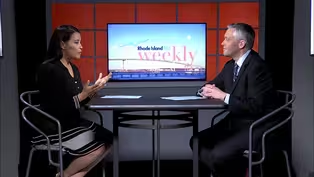
How Safe Are They?
Clip: Season 6 Episode 25 | 7m 43sVideo has Closed Captions
Despite repairing some 290 bridges, RIDOT still has a backlog of “Poor” bridges.
The sudden closure of the Washington Bridge raised concerns about Rhode Island’s other motor vehicle bridges. Rhode Island PBS and the Public’s Radio investigated those safety issues and what public officials have to say about them.
Problems playing video? | Closed Captioning Feedback
Problems playing video? | Closed Captioning Feedback
Rhode Island PBS Weekly is a local public television program presented by Ocean State Media

How Safe Are They?
Clip: Season 6 Episode 25 | 7m 43sVideo has Closed Captions
The sudden closure of the Washington Bridge raised concerns about Rhode Island’s other motor vehicle bridges. Rhode Island PBS and the Public’s Radio investigated those safety issues and what public officials have to say about them.
Problems playing video? | Closed Captioning Feedback
How to Watch Rhode Island PBS Weekly
Rhode Island PBS Weekly is available to stream on pbs.org and the free PBS App, available on iPhone, Apple TV, Android TV, Android smartphones, Amazon Fire TV, Amazon Fire Tablet, Roku, Samsung Smart TV, and Vizio.
Providing Support for PBS.org
Learn Moreabout PBS online sponsorship- Major thoroughfares are the bloodstream of our economy.
That's why we call them arteries.
The life of the region depends on a steady flow, so a sudden blockage (car horn honking) can ruin your day.
Even then, it could be worse.
That's what former transportation secretary, Pete Buttigieg, said when he toured the newly closed Washington Bridge.
- Lives were saved by the inspection that found this issue so that it could be addressed through construction rather than after something bad happened.
- [David] But what about the rest of the state's infrastructure?
How worried should we be about Rhode Island's 782 other big bridges that carry motor vehicles?
Only four other states have a higher percentage of structurally deficient bridges.
Here in Rhode Island, more than 15% of the bridges, that's more than twice the national average.
Plenty of them are getting long in the tooth.
Some were already crumbling back in 2016 when Vice President Joe Biden came to see for himself.
- For 10 years, you've had Lincoln Logs holding the damn thing up?
No, I mean, go look at it!
The press went and looked at it.
If everybody in Rhode Island watched the news tonight and saw that, they tried to go around the damn bridge.
- That was nearly a decade ago.
The McCormick Quarry Bridge in East Providence has since been repaired, so have many others, but not nearly enough.
Our own review of public records found a total of 119 bridges rated as poor in the most recent available data.
75 of them have been listed as poor every year for nearly a decade.
Those poor bridges are scattered all over the state.
Some are so small, you barely even notice them, like this one in Central Falls, which carries more than 7,000 cars a day.
This bridge in Central Falls has been listed in poor condition for more than a decade now.
You can see where the concrete has started to crumble and the rebar is exposed, and this bridge poses a unique hazard.
Reinforced by Lincoln Logs, it passes right over Amtrak's Northeast Corridor.
(train whooshing) You don't have to be an engineer to see the potential disaster waiting to happen.
On a bigger, grander scale, there's the Claiborne Pell Newport Bridge, where the bumpy ride provided by potholes is actually the least of your worries.
The National Transportation Safety Board recently flagged the Pell Bridge among 68 US bridges in need of urgent inspection.
The concern here is that large ocean-going vessels passing under the bridge might strike one of the pylons, bringing the whole thing tumbling down.
Just like what happened in Baltimore, only here in Narraganset Bay.
We reached out to the Rhode Island Turnpike and Bridge Authority, which owns and operates that major bridge and three others.
They told the NTSP they've conducted their own "comprehensive internal review" and determined that the vessels navigating these waters are smaller than the container ships entering Baltimore Harbor.
They said they have "initiated engagement" with an engineering firm to perform vulnerability assessments.
That report is expected within the year.
We reached out to the Rhode Island Department of Transportation too on the 783 motor vehicle bridges they're responsible for.
They won't talk about the Washington Bridge, citing ongoing litigation.
Earlier this year, RIDOT director Peter Alviti was eager to reassure state lawmakers.
- The bottom line is people wanna know that that bridge is safe.
- [David] He said RIDOT is making good progress on repairs, having fixed 290 bridges during his tenure.
He said they're now doing multiple inspections to make sure bridges are safe.
- Not only have we instituted the practice to go way above even what is normally practiced throughout the United States, we have instituted practices that both increase our surveillance and the level of detail at which we analyze and inspect more complex bridge structures, particularly the more complex ones.
- [David] RIDOT declined to let us speak with any bridge inspectors or see the process for ourselves.
Bottom line, Alviti's message to the public is, "Trust me," despite the Washington Bridge fiasco.
- We spent the last 10 years at DOT building a wonderful trust between us, the legislature, and the people of the state of Rhode Island.
And we don't want to see this one incident and this one bridge disrupt that trust.
- [David] But earlier this month, two of the subcontractors the state is currently suing claimed RIDOT ignored a 1992 inspection report, recommending additional tests.
They insist RIDOT knew, or should have known, visual inspections weren't good enough.
- The remarkable thing looking at the Washington Bridge project is that here we are a few years out and it's still unclear to the public who is ultimately responsible for this debacle.
- [David] Marc Dunkelman is a fellow at the Watson Institute at Brown, and author of the bestselling book, "Why Nothing Works."
- There's no clear authority, in most of these cases, of who exactly is in charge, who's responsible?
- Well, presumably, the Rhode Island Department of Transportation, no?
- Yes, but they let contracts in which the risk is shared with the contractors who are doing the work.
It's still, there are ongoing lawsuits.
How did this happen and how at this point do we not have a clear picture?
- Bottom line, it sounds like you have compassion for the Rhode Island Transportation officials who were charged with maintaining infrastructure.
- My general view is that people in the bureaucracy want to do the right thing and feel constrained.
- So the intentions are good, but the roadblocks are real and significant.
- Yes.
Video has Closed Captions
Clip: S6 Ep25 | 7m 29s | Providence’s first distillery since Prohibition makes waves with unique flavors. (7m 29s)
Video has Closed Captions
Clip: S6 Ep25 | 5m 13s | Perseverance advice from a man who biked across America and ran 50 marathons. (5m 13s)
Video has Closed Captions
Clip: S6 Ep25 | 4m 5s | Spending is outpacing taxes in RI. And there’s news on the bottle bill. (4m 5s)
Providing Support for PBS.org
Learn Moreabout PBS online sponsorship
- News and Public Affairs

Top journalists deliver compelling original analysis of the hour's headlines.

- News and Public Affairs

FRONTLINE is investigative journalism that questions, explains and changes our world.












Support for PBS provided by:
Rhode Island PBS Weekly is a local public television program presented by Ocean State Media


